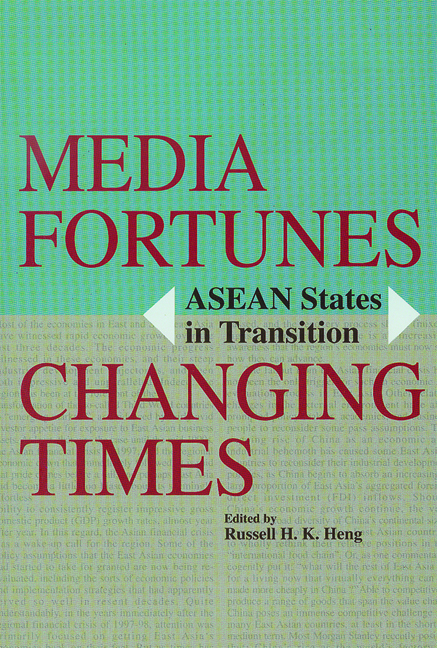Book contents
- Frontmatter
- Contents
- Foreword Wolfgang Möllers
- Acknowledgements
- Contributors
- Introduction
- Chapter 1 Media in Southeast Asia: A Literature Review of Post-1980 Developments
- Chapter 2 Cambodian Media in a Post-Socialist Situation
- Chapter 3 Industrialized Media in Democratizing Indonesia
- Chapter 4 Indonesian Television and the Dynamics of Transition
- Chapter 5 The Impact of Economic Transition on the Media in Laos
- Chapter 6 The Media and Malaysia's Reformasi Movement
- Chapter 7 Myanmar Media: Meeting Market Challenges in the Shadow of the State
- Chapter 8 Singapore: Media at the Mainstream and the Margins
- Chapter 9 Offending Images: Gender and Sexual Minorities, and State Control of the Media in Thailand
- Chapter 10 Vietnamese Media in Transition: The Boon, Curse, and Controversy of Market Economics
- Index
Introduction
Published online by Cambridge University Press: 03 November 2017
- Frontmatter
- Contents
- Foreword Wolfgang Möllers
- Acknowledgements
- Contributors
- Introduction
- Chapter 1 Media in Southeast Asia: A Literature Review of Post-1980 Developments
- Chapter 2 Cambodian Media in a Post-Socialist Situation
- Chapter 3 Industrialized Media in Democratizing Indonesia
- Chapter 4 Indonesian Television and the Dynamics of Transition
- Chapter 5 The Impact of Economic Transition on the Media in Laos
- Chapter 6 The Media and Malaysia's Reformasi Movement
- Chapter 7 Myanmar Media: Meeting Market Challenges in the Shadow of the State
- Chapter 8 Singapore: Media at the Mainstream and the Margins
- Chapter 9 Offending Images: Gender and Sexual Minorities, and State Control of the Media in Thailand
- Chapter 10 Vietnamese Media in Transition: The Boon, Curse, and Controversy of Market Economics
- Index
Summary
Over the last 20 years, a sense of “transition” has dominated the affairs of the ten member nations of ASEAN — Brunei, Cambodia, Indonesia, Laos, Malaysia, Myanmar, Philippines, Singapore, Thailand, and Vietnam. Transition does not just refer to changes in general. It comes about only when the magnitude of these changes points to a transformation of the status quo in significant ways. For some countries, it is the transition from authoritarianism to democracy. For others, the transition is from a planned socialist economy to a capitalist market model. Technological and lifestyle changes are also transforming societies in the region. Chapter 1 sets down these events in greater detail.
Synergy exists among the various types of transition; the dynamics in one often trigger change-inducing forces in another. For example, market reforms in the state-controlled socialist economies — Vietnam, Laos, Cambodia and Myanmar — provide individuals with more options for work, a trend that facilitates greater independence from the state. They also enhance the connections between these societies and the rest of the world. These are liberalizing influences that must be given some leeway by the political leadership if the latter wants the market transition to be a success. In other parts of the region, thriving market economies have produced affluent and better-educated societies that will hanker for a more democratic political culture (the underlying assumption of modernization theory). Economic development has to reach a certain level for IT (Information Technology) to become widely available to the public. The IT-facilitated free flow of information needs a certain level of democratic allowance. When a society rides the crest of this IT revolution and allows its citizens considerable exposure to a wide range of international influence, it hastens socio-cultural transformation. This also generates more political space.
These different strands of transition can be interwoven in any number of permutations to make up a rich and diverse tapestry of societal change; but as much as it is essential to acknowledge their connectivity, it is sometimes necessary to refer to the transitional trends as distinct and separate identities. This is because different countries place a different emphasis on each of them.
- Type
- Chapter
- Information
- Media Fortunes, Changing TimesASEAN States in Transition, pp. xiii - xviiiPublisher: ISEAS–Yusof Ishak InstitutePrint publication year: 2002



